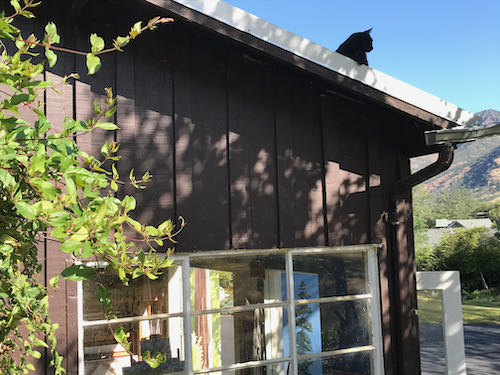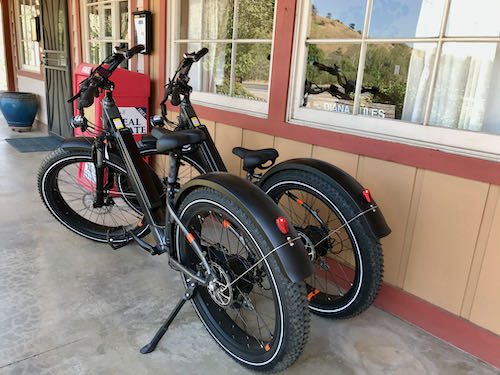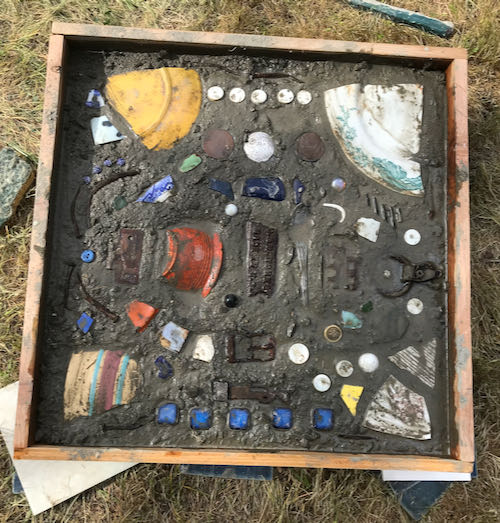
- Converting a print book to an ebook is a bit of a slog. The type cannot be justified but has to be “ragged right/justified left”; text cannot wrap around photos; all blank pages (the left side or “verso” page that forces chapters to begin on the right or “recto” page) need to be deleted. Boring, perhaps, but I did learn this in April while converting Adventures in Boy Scouting: Tales by the Old Scoutmaster to an eBook. (print book available here)
- The correct term for the little card that allows you to drive legally is DRIVER license, not DRIVER’S license. (I know—nobody cares, anymore than they care that it is Daylight SAVING Time rather than “Savings”)
 Electric bicycles! My friend bought a pair and invited me on the maiden voyage. What a hoot! They weighed a ton and there were many little buttons and levers, so we stood in the parking lot for awhile trying to understand what was what. Then we made some circles around the lot before heading out. It was definitely not a workout, it was definitely fun (everything I do with her is fun), and I definitely don’t want to own one. She decided that they are just a moped with the option for a little exercise.
Electric bicycles! My friend bought a pair and invited me on the maiden voyage. What a hoot! They weighed a ton and there were many little buttons and levers, so we stood in the parking lot for awhile trying to understand what was what. Then we made some circles around the lot before heading out. It was definitely not a workout, it was definitely fun (everything I do with her is fun), and I definitely don’t want to own one. She decided that they are just a moped with the option for a little exercise.  These are Phacelia campanularia, AKA desert bluebells, native to Southern California. Deer don’t seem to like them, but the gophers did.
These are Phacelia campanularia, AKA desert bluebells, native to Southern California. Deer don’t seem to like them, but the gophers did.- I lent my piano to the annual Jazz Affair here in Three Rivers for a session called “Dueling Pianos”. I learned that mine is called a “spinet”, the other was an “upright”, and they were closer to dancing than to dueling.I learned that there are people who can play in perfect synchronization without ever looking at music, discussing what key or tempo, who will begin, when to end, or even practicing together. Blew my mind. My piano has never ever sounded like that before, and unless the High Sierra Jazz Club needs to borrow it next year, it never will again.
- Here is a matter of consequence to contemplate: “Over the past few centuries, we’ve traded speed for rigor; innovation for wisdom; achievement for sanity; technology for connection; and disconnection for immediate comfort. And we’re all paying the price.” Excerpt from Dr. John Delony, Own Your Past, Change Your Future. This book became available at the end of the month, but because I preordered it, I got an e-book to read before the real one arrived. I haven’t finished it yet, because I’d rather read a paper book than a screen one.
- I tried to make a stepping stone with poured cement instead of a preformed one. That is because I had some chunky items that needed to be tapped down into the wet cement. Instead of wasting the items that I have been collecting for several years, I used some tiles to make an experimental one. Good thing, because it crumbled. An experienced friend helped me make a second one, and his experience made all the difference. He built a mold, brought the right tools to mix the cement correctly, knew the right consistency, and even helped arrange the items. Here it is while still wet.

- If a plant in my yard survives the deer, chances are that a turkey will smash it. After planting 12 foxgloves last year, 5 survived a week in the summer without water. Those five promised blooms, and then those stupid wild turkeys broke the stalk of at least one. So, planting 12 and getting 4 blooms means I only have a 25% ROI on my planting. (Haha, clumsy turkeys – all the daffodils survived)

- The past participle of “prove” is “proved”, not “proven”. “Proven” is reserved for use as an adjective, such as “It is a proven principle that one should consult the Chicago Manual of Style when deciding the correct participle of ‘prove'”.
6 Comments
These monthly learning posts are wonderful. I always learn good things from them–this time, pure grammar!
Louise, it is fun to compile these posts, and it is also fun to review older ones. I seem to forget much of what I have learned so quickly!
2. Yes, and thank you!! (Next: getting people to say “tuna” rather than “tuna fish.” After all, what other kind of tuna is there? It’s like saying “apple fruit” or “broccoli vegetable.” But I digress.)
5. Ah, but do you know the difference between a spinet, an upright, and a grand piano?
6. This reminds me of a book that was published long ago (before cell phones, even!) called “Tyranny of the Urgent.” (And yes, I know quotes don’t apply to book titles, but I can’t add italics on my post. But I digress.) Same idea, different decade.
8. Whenever I see “foxglove” I see the Wollenman cabin, oops!
9. Grammar. When used properly, it’s a Beautiful Thing!
Sharon:
5. A spinet is short, an upright is tall, and a grand is all spread out (deep).
6. I didn’t understand the “trading speed for rigor”; seems to me we have traded rigor for speed.
8. Oh yes, totally understand about the Wollenman.
9. So many rules! I have nothing but admiration for people who speak multiple languages.
5. “All spread out.” I’ve never heard a grand piano described that way, but it makes sense!
6. I think what he meant is before we were careful to do things right, to take time to carefully accomplish, whereas today everything is presented in 30-seconds (or less) sound bites, demand instant gratification, and we don’t want to take the time to do things methodically.
6. I think so, but it seems as if the words “speed” and “rigor” have been reversed. What we now have is speed; rigor would imply that we put more effort into things. I don’t think we have traded speed for rigor; I think we have traded rigor for speed!
Comments are closed for this article!